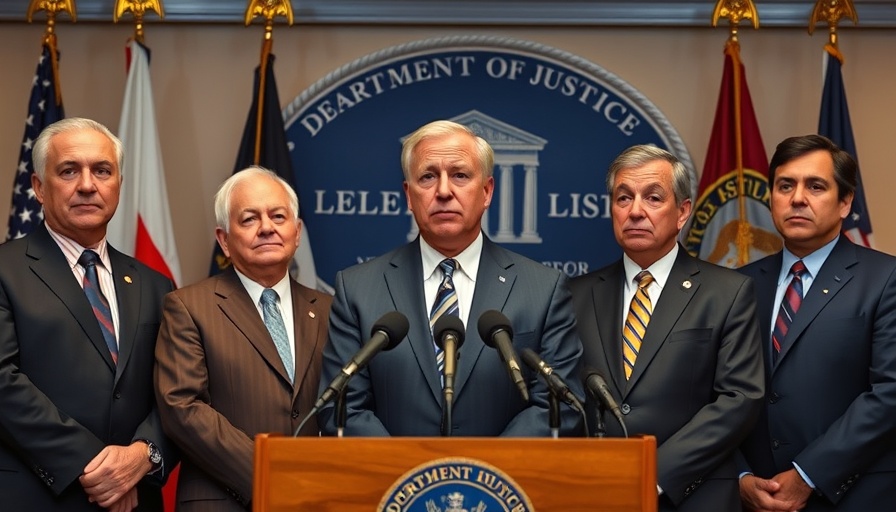
Understanding the Tragic Incident Involving Israeli Embassy Staff
The shocking murder of two Israeli embassy staff members in Washington, D.C., has drawn attention not only due to its brutality but also because of its implications for the ongoing discourse surrounding antisemitism in the United States. The alleged assailant has publicly stated, 'I did it for Palestine,' raising questions about the motivations underlying such violent acts. This incident underscores a growing concern over the safety of Jewish community members and their representatives amidst increasing antisemitic sentiments.
An Overview of Charges and Legal Consequences
Charged with the execution-style shooting, the suspect now faces multiple charges, including first-degree murder, which could potentially lead to a death penalty case. This legal stance signals a serious commitment from federal and local officials to address violence motivated by hate. These charges have sparked a nationwide conversation regarding the prosecution of hate crimes and the measures necessary to protect minority communities.
The Broader Picture: Antisemitism in the U.S.
The attack on the embassy staffers is a particularly alarming reminder of the rising tide of antisemitism that has permeated various aspects of American life. As reports from organizations tracking hate crimes have shown, antisemitic incidents have surged, creating fear within Jewish communities. Such events have introduced regular 'rallying calls' for action from Jewish leaders, emphasizing the need for solidarity in combating hatred.
Community and Political Reactions to the Shooting
Following the shooting, community leaders and political figures have expressed their horror over the violent act targeting Israeli representatives. Rabbi leaders in Washington have labeled the tragedy as a call to action, urging Americans across the board to stand united against all forms of hate. This sentiment was echoed by several politicians, who have called for comprehensive policies that tackle hate from all angles, including education, community outreach, and law enforcement collaboration.
Historical Context: A Plea for Understanding
Historically, the relationship between the U.S. and Israel has been complicated, and events like this incident often catalyze broader discussions surrounding Middle Eastern geopolitics and the Israeli-Palestinian conflict. It reveals the tragic and often divisive intersection of political beliefs and violent actions. Understanding this context is crucial for comprehending the motivations behind actions like the recent shooting.
Incorporating Perspectives: Seeking Solutions Amidst Conflict
In light of this tragedy, discussions are evolving not only around legal ramifications but also around the societal responsibility to foster an environment of respect and understanding. Various perspectives suggest that engaging in open dialogues about cultural and political differences can play a vital role in mitigating hate and violence. Community-building initiatives have been proposed, encouraging different groups to come together for shared goals.
Future Predictions and Opportunities for Change
As we witness an increase in hate-driven violence, experts speculate that future interventions focused on education and community resilience will be essential. Programs designed to teach tolerance and awareness in schools, alongside public campaigns addressing antisemitism, could pave the way for a more inclusive society. The hope is that this tragic incident can serve as a catalyst for change, prompting deeper conversations about acceptance.
Understanding the Legal Landscape of Hate Crimes
This case has highlighted a critical aspect of the legal framework surrounding hate crimes in the U.S. The process for charging hate-related offenses can vary greatly depending on state laws and the particulars of each case. There are ongoing debates around enhancing penalties for hate-inspired violence, which directly affects how such incidents are prosecuted in the future.
By understanding the implications of this case and participating in discussions surrounding it, individuals can contribute to a more compassionate society. Engaging in dialogue with people from different backgrounds promotes understanding and can mitigate the divisive narratives that lead to violence.
In the aftermath of this tragic incident, community members are encouraged to remain vigilant and empathetic, recognizing that the fight against hatred requires collective effort. Justice must prevail for the victims, but addressing the root causes of hate and violence will ultimately determine the future of societal cohesion.
 Add Element
Add Element  Add Row
Add Row 



 Add Row
Add Row  Add
Add 


Write A Comment